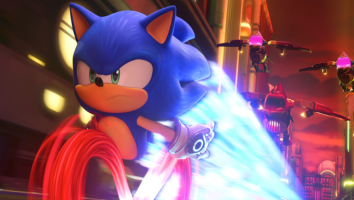While Toronto, Canada isn’t exactly known as a major game-making hub, things may be about to change. Earlier this month video game publishing giant Ubisoft announced it’s investing US$430 million, backed by a US$227 million commitment from the local provincial government, to build a new 800-employee studio in the city. There are also smaller game inventors cropping up all over the metropolis and indie developer Capybara Games, which crams its titles full of love and cute, is certainly one to watch.
Capybara generated a fair bit of buzz at last month’s E3 in L.A. for its forthcoming kid-friendly downloadable puzzle game, Critter Crunch. Players take control of Biggs, a roly-poly creature with a voracious appetite that uses his long, sticky tongue to nab critters dangling from jungle vines and feeds the smaller ones to the larger creatures until they’re full to bursting. Literally. The stuffed ones erupt into jewels – which are what Biggs is really after. A round ends successfully when he’s gobbled up enough gems to sate his hunger.
Infused with flavors from popular arcade puzzlers like Tetris and Bust-A-Move, Critter Crunch has actually been on mobile for a couple of years, garnering recognition from the industry, including the 2007 Best Puzzle Game award (IGN Wireless). It’s now ready for the big time – a PS3 version is being readied for release on PlayStation Network this summer.
Mobile is where it all began for the gameco, notes president Nathan Vella, who helped found Capybara back in 2003 with a group of like-minded gamers who met on a web forum and decided to shell out US$70 for development software and a phone line. The company started gaining momentum after attending the Game Developers Conference in 2005, where it landed a mobile games license from Disney/Pixar for Cars. Since then, the now 23-person outfit has rolled out licensed mobile titles for Disney’s Pirates of the Caribbean and American Idol from FremantleMedia.
While it’d be open to discussions on other licenses, Capybara’s chief priority is crafting original IPs, many of which possess kid-appeal. Additionally, the growth of user-friendly media download services for this crop of consoles – PSN, WiiWare and Xbox Live Marketplace – is making it easier for indie developers to get exposure and build an audience. There’s no fighting for physical shelf space and the titles are more affordable, making it easier for kids seeking new gaming experiences. In fact, says Vella, because many kids stockpile virtual currency (e.g. Wii Points) to pay for these games, they don’t need to beg their parents for money every time they want to make a purchase.
Capybara’s currently hard at work on a WiiWare title and a few iPhone games (one for Critter Crunch is already available), but that’s not to say it isn’t interested in creating cartridge titles. The company is putting the finishing touches on its first Nintendo DS offering, strategy puzzler Might & Magic: Clash of Heroes, being published by Ubisoft in early fall.





















